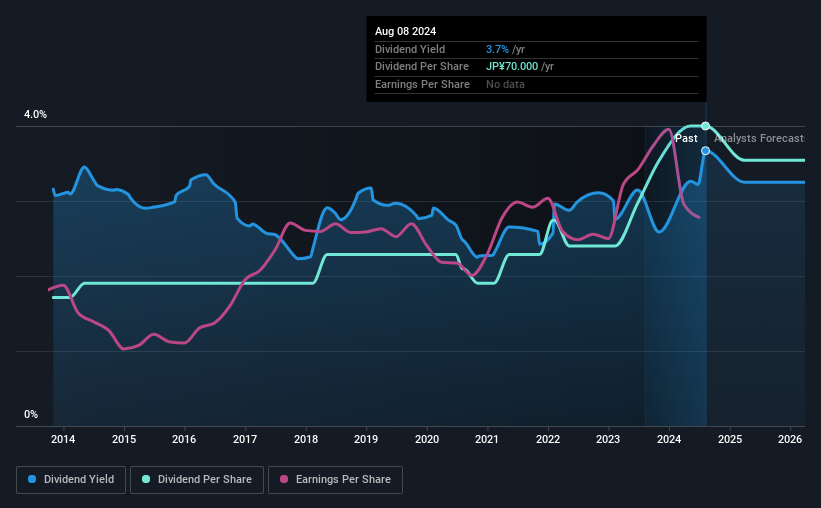- Japan
- /
- Electronic Equipment and Components
- /
- TSE:7723
Aichi Tokei Denki's (TSE:7723) Dividend Will Be Increased To ¥35.00
The board of Aichi Tokei Denki Co., Ltd. (TSE:7723) has announced that it will be paying its dividend of ¥35.00 on the 27th of November, an increased payment from last year's comparable dividend. This will take the dividend yield to an attractive 3.7%, providing a nice boost to shareholder returns.
View our latest analysis for Aichi Tokei Denki
Aichi Tokei Denki's Dividend Is Well Covered By Earnings
We like to see robust dividend yields, but that doesn't matter if the payment isn't sustainable. Based on the last payment, Aichi Tokei Denki was paying only paying out a fraction of earnings, but the payment was a massive 212% of cash flows. While the business may be attempting to set a balanced dividend policy, a cash payout ratio this high might expose the dividend to being cut if the business ran into some challenges.
The next year is set to see EPS grow by 13.2%. Assuming the dividend continues along recent trends, we think the payout ratio could be 33% by next year, which is in a pretty sustainable range.

Dividend Volatility
While the company has been paying a dividend for a long time, it has cut the dividend at least once in the last 10 years. The dividend has gone from an annual total of ¥30.00 in 2014 to the most recent total annual payment of ¥70.00. This implies that the company grew its distributions at a yearly rate of about 8.8% over that duration. It's good to see the dividend growing at a decent rate, but the dividend has been cut at least once in the past. Aichi Tokei Denki might have put its house in order since then, but we remain cautious.
The Dividend's Growth Prospects Are Limited
Growing earnings per share could be a mitigating factor when considering the past fluctuations in the dividend. Aichi Tokei Denki hasn't seen much change in its earnings per share over the last five years. While growth may be thin on the ground, Aichi Tokei Denki could always pay out a higher proportion of earnings to increase shareholder returns.
Our Thoughts On Aichi Tokei Denki's Dividend
In summary, while it's always good to see the dividend being raised, we don't think Aichi Tokei Denki's payments are rock solid. With cash flows lacking, it is difficult to see how the company can sustain a dividend payment. This company is not in the top tier of income providing stocks.
Companies possessing a stable dividend policy will likely enjoy greater investor interest than those suffering from a more inconsistent approach. At the same time, there are other factors our readers should be conscious of before pouring capital into a stock. As an example, we've identified 1 warning sign for Aichi Tokei Denki that you should be aware of before investing. Is Aichi Tokei Denki not quite the opportunity you were looking for? Why not check out our selection of top dividend stocks.
New: Manage All Your Stock Portfolios in One Place
We've created the ultimate portfolio companion for stock investors, and it's free.
• Connect an unlimited number of Portfolios and see your total in one currency
• Be alerted to new Warning Signs or Risks via email or mobile
• Track the Fair Value of your stocks
Have feedback on this article? Concerned about the content? Get in touch with us directly. Alternatively, email editorial-team (at) simplywallst.com.
This article by Simply Wall St is general in nature. We provide commentary based on historical data and analyst forecasts only using an unbiased methodology and our articles are not intended to be financial advice. It does not constitute a recommendation to buy or sell any stock, and does not take account of your objectives, or your financial situation. We aim to bring you long-term focused analysis driven by fundamental data. Note that our analysis may not factor in the latest price-sensitive company announcements or qualitative material. Simply Wall St has no position in any stocks mentioned.
About TSE:7723
Aichi Tokei Denki
Engages in the provision of water and gas meters, and related equipment in Japan and internationally.
Flawless balance sheet with solid track record.
Similar Companies
Market Insights
Community Narratives


Recently Updated Narratives

Constellation Energy Dividends and Growth

CoreWeave's Revenue Expected to Rocket 77.88% in 5-Year Forecast

Bisalloy Steel Group will shine with a projected profit margin increase of 12.8%
Popular Narratives


MicroVision will explode future revenue by 380.37% with a vision towards success


NVDA: Expanding AI Demand Will Drive Major Data Center Investments Through 2026



